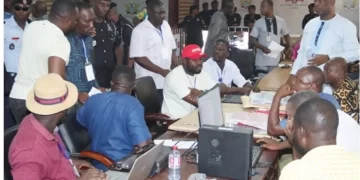 Government has officially announced the much-anticipated 24-hour economy policy to be launched on Wednesday, July 2, 2025.
Government has officially announced the much-anticipated 24-hour economy policy to be launched on Wednesday, July 2, 2025.
This programme, a flagship initiative of the National Democratic Congress (NDC), is expected to promote continuous economic activity, create jobs, and drive national productivity.
The 24-hour economy policy was a key campaign promise of President John Dramani Mahama and the NDC ahead of the 2024 general elections.
Presidential Advisor on the 24-hour Economy, Goosie Tanoh, confirmed the launch date during a presentation of the final policy document to the Speaker of Parliament, Alban Bagbin, on Thursday, June 26, 2025.
According to Mr. Tanoh, the 24-hour economy is anchored on three key pillars: transforming production, strengthening supply chains and market efficiency, and building human capital to meet the demands of a modern economy.
“Production transformation, supply chain and market efficiency, and human capital development. These foundational anchors are supported by eight strategic sub-programmes,” he said.
He explained that these pillars are supported by eight strategic sub-programmes, including initiatives to modernise agriculture, boost manufacturing, improve logistics and supply chains, reshape national work culture, and promote Ghana’s rich cultural heritage to attract tourism and generate foreign exchange.
“Roll 24 – which is the agricultural component, Make 24 – which is the manufacturing component, Connect 24 – the supply chain component, Aspire 24 – which is the mindset change, the resetting of the Ghanaian and Ghanaian bureaucracy with a strong and powerful attitude to work and productivity.”
Mr. Tanoh also revealed that the policy would prioritise integrating digital technology and skills training into Technical and Vocational Education and Training (TVET) programmes, ensuring Ghana’s workforce is adequately prepared to seize opportunities in the 24-hour economy.
Speaker of Parliament, Alban Bagbin, while welcoming the initiative, called for strong legislative backing to guarantee the policy’s sustainability beyond political transitions.
He urged the 24-hour Economy Secretariat to collaborate with lawmakers to draft and pass legislation that will institutionalise the programme as a national development strategy.
The government believes the 24-hour economy will be a game-changer, providing solutions to unemployment, enhancing productivity, and driving sustained economic growth. The upcoming launch is expected to mark the beginning of nationwide efforts to operationalise the policy.





















